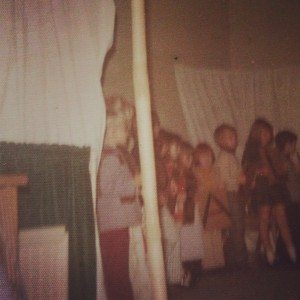
Christmas time means celebrating the birth of Jesus, writing letters to Santa Claus, eating lots of great food that we normally don’t get the rest of the year, and, of course, opening presents. But the oncoming of the Christmas season, when the air first got cold and traces of snow began to descend, when the leaves had all fallen from the trees and everyone was looking for things to do indoors, let me know that the greatest time of the year was upon us – the time of the church Christmas pageant.
I’ve been an actor at heart all of my life, but growing up in central Kentucky in the late 70’s and early 80’s didn’t offer a lot of opportunities to display this natural talent – with one exception – the Christmas pageant. As with many churches, our tradition was to re-enact the nativity scene. And there were really only three parts for boys to play – Joseph, a shepherd, or a wise man. And there was a different skill set that came with each of the roles. Occasionally, if we had a year where there were a lot of boys, we would make the pageant grander with an innkeeper, townspeople of Bethlehem, and even King Herod. But typically, we stayed with the basics.
The role of Joseph didn’t require a lot of ability. You walked Mary down the aisle and hoped she didn’t drop the naked baby doll out of her gown, then once she was positioned at the manger, you stood over her and looked down at the baby. And that is all you did for the entire pageant – stood over Mary and looked at the baby. Now, Joseph is an important Biblical figure and I don’t want to make light of the position, but anybody can just stand there. So the part was generally given to the unmotivated among us who was just doing it because his parents were making him do it.
Now the three wise men were reserved for the three oldest boys in the group. They had paid their dues, coming up through the ranks of shepherdam, and deserved to have the highest honor of male parts (with the exception, of course, of baby Jesus, which was always given to a naked baby doll). The wise men had the coolest outfits with glittering jewels on their costumes and sparkling crowns on their heads. They entered with all pomp and circumstance as the choir sang “We Three Kings.” They bowed before the naked baby doll and presented their gifts of gold, frankincense and myrrh, which were generally just old jewelry boxes with nothing in them. Once a wise man accidently picked up a music box from the props and opened his gift to baby Jesus with a stirring rendition of “The Entertainer.”
But for the real actor – and for every other boy who just needed a part in the pageant – there were the shepherds. This part required skill, because we had to watch over some cardboard cut-out, cotton-covered sheep while leaning on our walking sticks. Then when the angels appeared (which were all of the girls who couldn’t be Mary), we had to be frightened. And then . . . then the only spoken lines in the play came from one of the older girls as she recited the angel’s lines from the Bible. We had to go from fright to wonder to excitement all in the matter of seconds. Oh, what joy it was to show the inner emotions of the shepherds during that angelic visit. Then after gathering in a huddle as if we were going to draw a football play in the sand, we walked over to the back of the manger and bowed on one knee. We weren’t allowed in front of the manger, that was only for the wise men, but by that time, we had done our part, and I was emotionally drained from the energy of the previous scene.
And at some point while the wise men played out their scene, someone around the manger would act up, even if it was only known to us on stage. The pains of staying in character bordered on excruciating as the class clown would whisper something inappropriate or an actor doing the unthinkable sin of locking his legs together for too long and falling out of position, or someone, who had eaten one bowl of chili too many, passed gas that made all of us want to puke on the naked, baby doll Jesus. But no matter what happened, when all of the songs had been sung and everyone had been reminded of the reason for the season, our parents, teachers, and church members congratulated us on a job well done. And with smiles, I knew it was only a year until the next performance.
This article originally appeared in The Palladium-Item (Richmond, Indiana), December 24, 2010